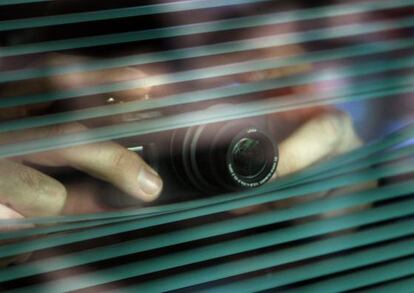Top court bars journalists from using hidden cameras
Furtive recording "is based on a ruse or deception that the journalist deploys," says ruling

The Constitutional Court has ruled for the first time that the use of hidden cameras by journalists is "illegitimate," regardless of the public relevance of the subject of the investigation. Declaring the practice constitutionally prohibited, the highest court stated that furtive recording "is based on a ruse or deception that the journalist deploys by simulating an opportune identity according to the context."
The resolution was handed down in the case of a journalist contracted by a television production company, Canal Mundo Producciones Audiovisuales, who posed as a patient at the home of a beautician who carried out consultations there. During the meeting, the reporter recorded the beautician's face and voice with a hidden camera.
The tape was subsequently used in a program about unqualified people posing as health professionals, which was broadcast on Valencian regional television. The program revealed that the subject had served a jail sentence years earlier for posing as a physiotherapist without holding the necessary license.
The court ruled that the beautician was filmed "surreptitiously" and therefore denied the right to decide whether or not to consent to the disclosure of information that determined full identification.
Privacy rights
The unwitting subject of the report made a complaint to the authorities on the grounds that the program damaged her honor and on the basis that its broadcast violated her rights to privacy. A Valencia court stated that the channel's report combined the necessary requirements of veracity, objectivity, general interest and informative intent to preclude a violation of rights.
The Supreme Court, however, ruled that an "illegitimate" interference in the complainant's privacy rights had been committed - but said her honor had not been damaged. The Constitutional Court's resolution stated that the method used to obtain the recording was neither necessary nor adequate for the subject of the inquiry. It concluded that carrying out interviews with the beautician's clients would have been sufficient because, regardless of the public interest in the report, "what is constitutionally prohibited is precisely the use of a hidden camera."
Tu suscripción se está usando en otro dispositivo
¿Quieres añadir otro usuario a tu suscripción?
Si continúas leyendo en este dispositivo, no se podrá leer en el otro.
FlechaTu suscripción se está usando en otro dispositivo y solo puedes acceder a EL PAÍS desde un dispositivo a la vez.
Si quieres compartir tu cuenta, cambia tu suscripción a la modalidad Premium, así podrás añadir otro usuario. Cada uno accederá con su propia cuenta de email, lo que os permitirá personalizar vuestra experiencia en EL PAÍS.
¿Tienes una suscripción de empresa? Accede aquí para contratar más cuentas.
En el caso de no saber quién está usando tu cuenta, te recomendamos cambiar tu contraseña aquí.
Si decides continuar compartiendo tu cuenta, este mensaje se mostrará en tu dispositivo y en el de la otra persona que está usando tu cuenta de forma indefinida, afectando a tu experiencia de lectura. Puedes consultar aquí los términos y condiciones de la suscripción digital.








































